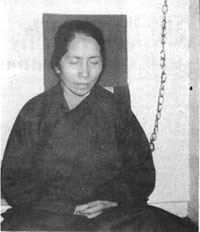Bodhi Stand
INTRODUCES
UPASIKA GUO REN HA
Born
in Vietnam in the 1930's, Guo Ren was a filial child, not only to her
parents, but humankind in general. When she was seven she would lose her
appetite or even refuse to eat if she saw animals being slaughtered for
her family's meals. At age ten she helped her parents by caring for her
brothers and sisters, and even when they scolded and hit her, she was
patient, thinking, "I was born to bear suffering."
Her
giving extended far beyond her own family circle, as she would always feed
poor people, and even offer her own household servants the good food they
had served to her. Always when she could, she would assist people, be they
rich or poor, old or young, sick or spiteful. "I was born to help
people," she thought. The question that persisted throughout her
childhood was "Why are we rich and other people poor?"
Guo
Ren took care of her parents until the day they died and saw to their
funeral and burial. During the period of mourning she ate strictly
vegetarian food, prayed, and liberated living beings to transfer merit to
assist her parents in their rebirth.
Once
her Master in Vietnam said: "Once a person wasted seven grains of
rice, and he was reincarnated for seven lives as a horse." After
that, whenever she saw someone who did not finish their food or who
dropped it on the table or even on the floor, she would pick it up and eat
it for them to save them from some severe retribution.
Upasika
Guo Ren has been happily married for thirty two years, and Lap Ha, her
husband, says of her, "My wife is not an ambitious woman, how lucky I
am to have her!" There are six children in the Ha family, four sons
and two daughters.
In
1975, the Has left Vietnam with their fourth son and two daughters to come
to America as refugees. Guo Ren relates: "We were in a hurry to leave
our country; each person was allowed to carry only one bag, so we left
everything behind."
The
first night they arrived in America, Guo Ren had a dream in which she saw
Gold Mountain Monastery (in San Francisco) and the next morning told her
family about the dream, describing both the inside and the outside of the
Monastery. Guo Ren's eldest son (who had come to the United States a few
years earlier to attend college) took the Ha family to see Buddhist
Temples in Berkeley, Oakland and San Francisco. "We bowed, made
offerings, and left without having found "the Temple"
|
